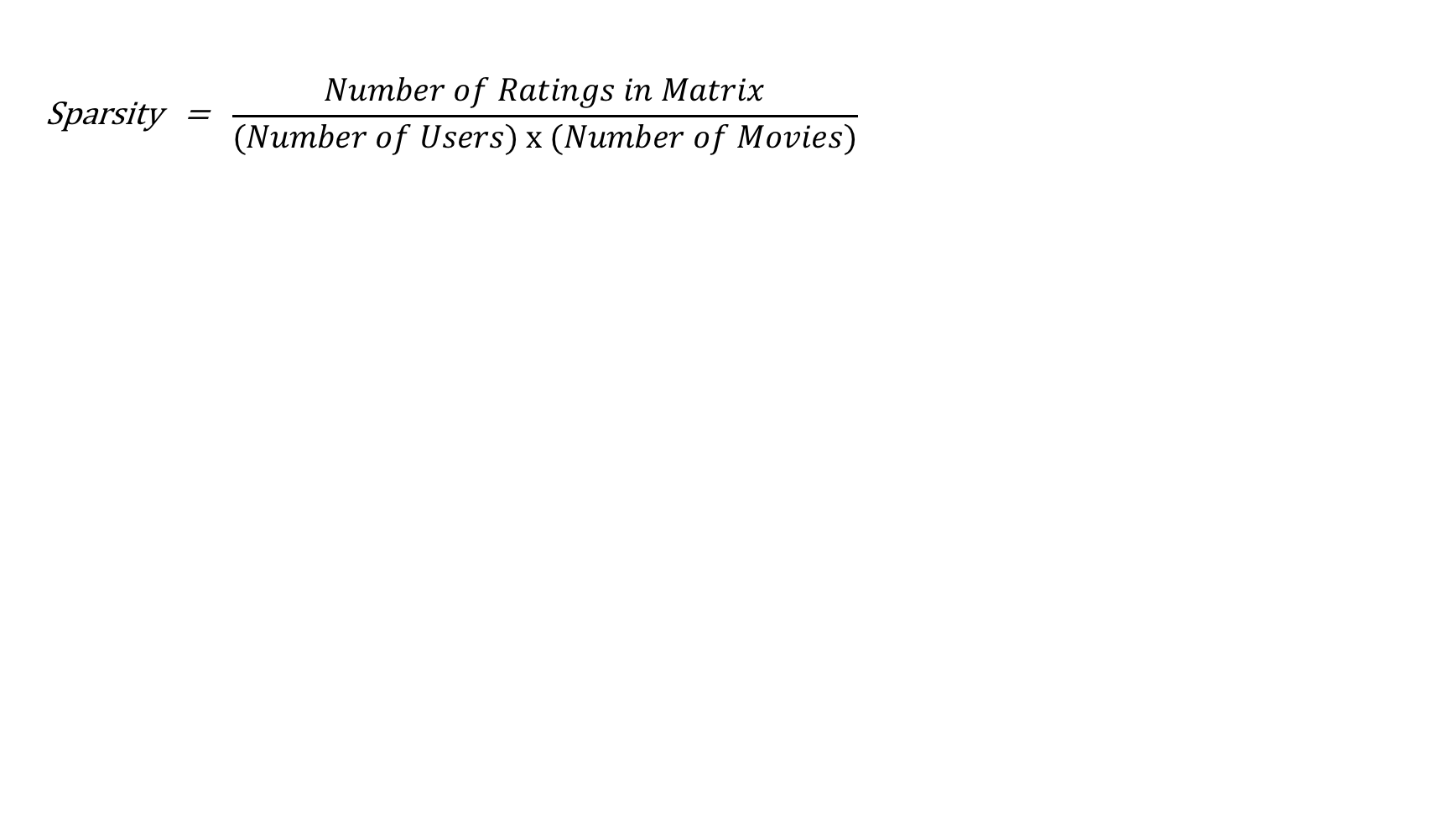Introduction to the MovieLens dataset
Building Recommendation Engines with PySpark

Jamen Long
Data Scientist at Nike
MovieLens dataset
F. Maxwell Harper and Joseph A. Konstan. 2015
The MovieLens Datasets: History and Context.
ACM Transitions on Interactive Intelligent Systems (TiiS) 5, 4, Article 19 (December 2015), 19 Pages.
DOI=http://dx.doi.org/10.1145/2827872
MovieLens summary stats
F. Maxwell Harper and Joseph A. Konstan. 2015
The MovieLens Datasets: History and Context.
ACM Transitions on Interactive Intelligent Systems (TiiS) 5, 4, Article 19 (December 2015), 19 Pages.
DOI=http://dx.doi.org/10.1145/2827872
Ratings: 20,000,000+
Users: 138,493
Movies: 27,278
Explore the data
df.show()
df.columns()
MovieLens sparsity

Sparsity: numerator
# Number of ratings in matrix
numerator = ratings.count()
Sparsity: users and movies
# Distinct users and movies
users = ratings.select("userId").distinct().count()
movies = ratings.select("movieId").distinct().count()
Sparsity: denominator
# Number of ratings in matrix numerator = ratings.count() # Distinct users and movies users = ratings.select("userId").distinct().count() movies = ratings.select("movieId").distinct().count()# Number of ratings matrix could contain if no empty cells denominator = users * movies
Sparsity
# Number of ratings in matrix
numerator = ratings.count()
# Distinct users and movies
users = ratings.select("userId").distinct().count()
movies = ratings.select("movieId").distinct().count()
# Number of ratings matrix could contain if no empty cells
denominator = users * movies
#Calculating sparsity
sparsity = 1 - (numerator*1.0 / denominator)
print ("Sparsity: "), sparsity
Sparsity: .998
The .distinct() method
ratings.select("userId").distinct().count()
671
GroupBy method
# Group by userId
ratings.groupBy("userId")
GroupBy method
# Num of song plays by userId
ratings.groupBy("userId").count().show()
+------+-----+
|userId|count|
+------+-----+
| 148| 76|
| 243| 12|
| 31| 232|
| 137| 16|
| 251| 19|
| 85| 752|
| 65| 737|
| 255| 9|
| 53| 190|
| 133| 302|
| 296| 74|
| 78| 301|
| 108| 136|
| 155| 3|
| 193| 174|
| 101| 1|
+------+-----+
GroupBy method min
from pyspark.sql.functions import min, max, avg
# Min num of song plays by userId
msd.groupBy("userId").count()
.select(min("count")).show()
+----------+
|min(count)|
+----------+
| 1|
+----------+
GroupBy method max
# Max num of song plays by userId
ratings.groupBy("userId").count()
.select(max("count")).show()
+----------+
|max(count)|
+----------+
| 1162|
+----------+
GroupBy method avg
# Avg num of song plays by userId
ratings.groupBy("userId").count()
.select(avg("count")).show()
+----------+
|avg(count)|
+----------+
| 233.34579|
+----------+
Filter method
# Removes users with less than 20 ratings
ratings.groupBy("userId").count().filter(col("count") >= 20).show()
+------+-----+
|userId|count|
+------+-----+
| 148| 76|
| 31| 232|
| 85| 752|
| 65| 737|
| 53| 190|
| 133| 302|
| 296| 74|
| 78| 301|
| 108| 136|
| 193| 174|
+------+-----+
Let's practice!
Building Recommendation Engines with PySpark

